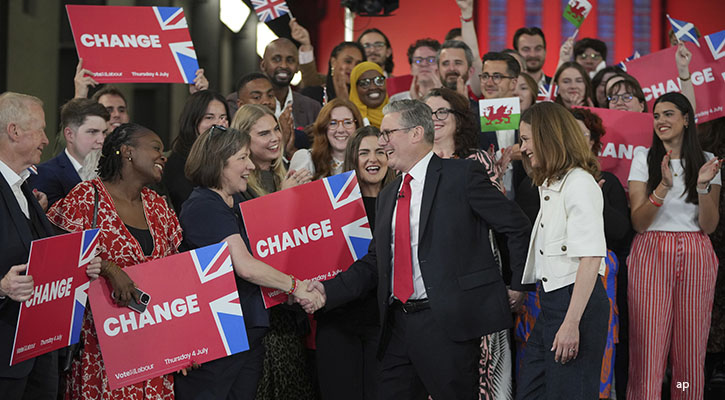
The FTSE 100 opened slightly higher this morning as Rishi Sunak returned to Downing Street following a bruising defeat in the general election last night.
With just three constituency seats left to declare results and Keir Starmer poised to visit the King to form a government, London's blue-chip index was up 0.19%, in what appeared to be the start of an upbeat end to the week's trading.
Sterling was also up 0.1% against the dollar to $1.278, and up against the Euro at €1.180.
Overall, the current numbers stand at 412 seats for the Labour Party, 120 for The Conservative Party, 71 for the Liberal Democrats, nine for the Scottish National Party, and four for the Reform Party.
"Following Labour's victory in the UK election, the focus now shifts to the party's immediate fiscal agenda," says Rachael Griffin, tax and financial planning expert at Quilter, in a note.
"The prevailing sentiment from Labour's campaign was one of moderation – the ethos was 'expect the expected.' Labour pledged not to raise the primary revenue-generating taxes – namely income tax, VAT, national insurance, and corporation tax.
"But with a mandate for change, the new government is well-positioned to implement significant reforms. The projected revenues from Labour's proposed measures (such as VAT on private school fees, removal of non-domicile status and windfall taxes) have been deemed by the Institute For Fiscal Studies as 'insignificant to negligible.'
"This has led to speculation about how the Labour government plans to finance the anticipated upsurge in public expenditure, without resorting to further tax hikes or exceeding the borrowing limits set by the fiscal rules that Rachel Reeves has committed the party to."
Among the major upsets across the night's results was the unseating of former prime minister Liz Truss in Norfolk South West, less than two years since her radical proposals to cut tax in the so-called mini-Budget sent the gilt markets into disarray and caused serious problems for pension funds that were leveraged using liability-driven investments.
Other Conservative candidates given their marching orders also included de facto financial services minister Bim Afolami in Hitchin, defence secretary Grant Schapps in Welwyn Hatfield, and Jacob Rees-Mogg in North East Somerset & Hanham. Penny Mordaunt also lost her Portsmouth North seat, while education secretary Gillian Keegan was defeated in Chichester by the Liberal Democrats.
Soon-to-be-former chancellor Jeremy Hunt did hold on to his seat in Godalming & Ash, though there was a -10.8% swing away from the Conservative Party in the constituency. Hunt's majority now stands at a measly 891, rendering his political career in the House of Commons vulnerable to further upset.
The outgoing prime minister Rishi Sunak, former Conservative Party leader Iain Duncan Smith, and Esther McVey also survived the vote to return to their seats in Chingford & Woodford Green, Tatton, and Richmond & Northallerton, respectively. Home secretary James Cleverly also held on in Braintree with a majority of less than 3,000.












.jpg)
















